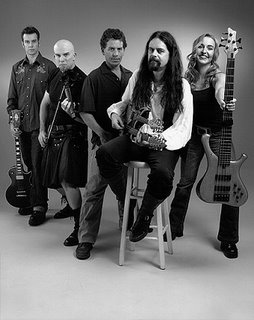In her post,
Blogging: An Innocent Fraud?,LaShawn Barber links to technology writer and blogger Nicholas Carr's post
The Great Unread. He discusses those of us who are in the "long-tail" of the blogsphere and how we must be disillusioned because we are seldom read. The "long-tail" refers to the power law distribution curve--for a good explanation, read Clay Shirky's article,
Power Laws, Weblogs, and Inequality.The discussion of the "long-tail" reminded me, of course, of the quote from
Alice in Wonderland that opens this post. Alice is sitting around listening to the mouse explain why she hates cats so and has mixed up the homophones
tale and
tail. And it also reminded me that this tale, like so many others, was originally written for an audience of three: Alice Liddell and her two sisters.
According to the theory of power laws, it will be quite difficult for me, rather a latecomer to the blogging world, to rise to the A-List. The "good"news is that it will be even more difficult for others who enter later. So am I discouraged? Will I stop blogging?
Well, if I don't blog, no one will read me. If I do blog, there is always a chance that someone will read me, find what I say interesting, and link to me. This will, of course, attract more people to my blog. Such a thing happened when
Michelle Malkin linked to me during the Dubai Ports World incident because I had an understanding of the situation that helped clarify what was going on. This led to a couple of other links and a brief rise of my blog in the TTLB Ecosphere.
LaShawn Barber has also been kind enough to give me a shout out and the occasional reader has found me through comments I have left there. As I have found them.
Writing is, essentially, a lonely occupation. The writer usually needs some space and time (and I find, in my case, solitude) to compose his/her thoughts and get them down on paper or computer. I live inside my head--a lot. I can understand why writers frequented bars or taverns or pubs, anywhere lively where there were a lot of people and a lot of social interaction. The blogsphere is kind of like a non-alcoholic version of the pub, a place where I can throw an idea or two out there and see if anyone agrees. I usually receive enough feedback to keep me going, to write one more day.
Okay, that last sentence was misleading. I can't
not write. I am addicted to writing, much as I'm addicted to reading. The great thing about the blogsphere is that I indulge this addiction and find others who share it.
Would I like to be an A-List (or even a B-List!) blogger, one whose opinions are taken seriously by the Powers That Be? Well, yes. The prestige and the recognition would be nice. And no. By hiding in the tail, I am much freer to write about what interests
me. I don't have the pressure of success. I don't have to hit a homerun every time at bat. Heck, I don't even have to hit the ball.
With the slow death of truly local newspapers, magazines, and other traditional media, there really are fewer places where writers can practice their craft, publish it, and get reactions. This is my practice space. This is where I hone
my voice, make
my voice unique. And find my niche. Perhaps there will be a payoff, big or otherwise, in the future. Probably not. Meanwhile, I'll take my payoff from the comments that are left and my status in the TTLB Ecosystem.








